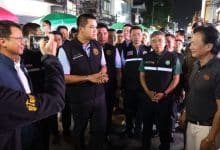Thailand News Today | New scam exposed on Khao San Road

Tourism is back so better be quick in devising new scams. A new warning has gone out as yet another scam is being perpetrated on foreigners on Khao San Road. This time, scam targets are would-be do-gooders trying to help return a lost wallet.
A man recently reported to local media that he stumbled upon a wallet on the ground, lying innocently next to a lamppost. He picked it up and inspected the lost wallet and discovered 1,000 baht inside.
He knew he wanted to do the right thing and turn it in, but it was very late and everything was closed, so he decided to hang onto it until the morning when he could return it to its rightful owner. The next day, a woman came around to claim the lost wallet, but that’s when things took a turn for the worse.
She demanded to know what happened to the other 5 or 6 thousand baht that had been in the purse when she lost it. The argument escalated and the police were involved.
The Chana Songkram police informed the man that his good deed had left him on the hook for the money the lost wallet owner claimed was missing. They advised him, despite his protests, that if he didn’t pay her the money, he could be prosecuted for theft.
The man was shocked that the police were taking the woman’s side and treating him as a criminal for trying to help. He tried to get assistance and contacted local friends who are Thai nationals, but no one could do anything to aid him and, in the end, he had no choice but to pay the woman for helping her.
Local vendors confirm that this was not the first time they heard of this scam being pulled on international travellers in the busy tourist area. Many are appealing to the police and authorities to take action to prevent this and other scams from being carried out.
Tourism stands in a fragile balance, with only a fraction of the numbers previously travelling to Thailand before Covid-19, and scams like this being perpetuated and publicised will drive tourists away when the country is desperately trying to bring them back. But still, we should expose scams when we can, even if they don’t save the country’s face.
So for now, think twice about picking up a lost wallet you find on the street.
——————
Last week, the University of the Thai Chamber of Commerce reported that Thailand’s Consumer Confidence Index had risen. The country’s CCI rose from 40.2 to 41.6 in June, indicating that Thailand’s economy is slowly but surely making a comeback after being devastated by the government’s Covid restrictions.
This news comes after Thailand’s CCI had been in decline for several months. April’s rate was 40.7, March’s was 42, February’s was 43.3, and January’s was 44.8. A purchasing power index below 100 is a sign of slow economic recovery and weak purchasing power. But could the recent jump be a sign of good things to come for the kingdom?
The UTCC predicts an economic growth rate of 5-7% this year, now that Thailand has lifted several tourism restrictions. Yeah…the next news story I have could see Thailand flip flop on that. The kingdom saw 1.9 million foreign tourists arrive from January to June 28. This raked in about 114 million baht in tourism revenue.
On July 1, the notorious ‘Thailand Pass’ was scrapped. Last week, the Tourism and Sports Ministry said it expected about 9.3 million foreign tourists in total to arrive in Thailand in 2022. Again, that’s if authorities don’t flip flop. If the ministry’s dreams come true, Thailand’s tourism revenue this year could likely be over 1.27 trillion baht.
UTCC President Thanavath Phonvichai acknowledged that the economic recovery also follows the extension of bar and pub service hours earlier this month.
The UTCC has predicted that the baht’s value will remain between 36 and 36.5 baht per US dollar over the next one to three months, before dropping very slightly to between 35 and 36 baht per dollar in the fourth quarter.
————
Here we go again. Please don’t shoot the messenger. The UN and the World Health Organisation is actively following a new sub-lineage designated BA.2.75, another variant of the Omicron variant.
It was first detected in India and has since been found in 10 other countries. The Director-General of the World Health Organisation, Tedros Ghebreyesus, noted that new Covid infections, globally, have increased nearly 30% over the past two weeks.
He said “In Europe and America, BA.4 and BA.5 are driving waves. In countries like India a new sub-lineage of BA.2.75 has also been detected, which we’re following.”
WHO Chief Scientist Soumya Swaminathan says that there has clearly been the emergence of a sub-variant that is being called the BA.2.75.
He said “There are still limited sequences available of the sub-variant to analyse but this sub-variant seems to have a few mutations and it’s still too early to know if this sub-variant has properties of additional immune evasion or indeed of being more clinically severe.”
The scientist noted that the WHO is now actively tracking BA.2.75 and the WHO Technical Advisory Group on SARS-CoV-2 Virus Evolution is “constantly looking at the data from around the world”.
Speaking about the general spread of the BA.4 and BA.5 sub-variants, Soumya noted that cases in SE Asia showed an increasing trend since early June.
“Over 157,000 new cases reported, a 20% increase as compared to the previous week. 5 of 10 countries, for which data are available, show increases in the number of new cases of 20% or greater.”
Bhutan, Nepal and Bangladesh are showing notable increases where immune escape and an increased transmissibility are causing concern.
WHO Covid-19 Incident Manager Abdi Mahamud says people should be careful not to assume that the coronavirus pandemic is over.
He said “Now is not the time to declare that the pandemic is over… and the virus has a lot of force left. Whether it is the BA.4 or BA.5 or BA.2.75, the virus will continue. It does what it does good… and people and communities must continue to wear masks, avoid crowds and ensure that the most vulnerable and high-risk population is protected.”
So be sure to subscribe and follow the Thaiger as we’ll certainly report on all the 99 thousand new variants that will come.
—————–
On Friday morning, July 8th, a traditional Thai ceremony took place near the Lieb Tang Rodfai Road in Pattaya to celebrate the rise of eight pillars of a new Eastern Economic Corridor development project (EEC), where five luxury villas and a hotel are scheduled to be constructed.
The architect responsible, Mario Kleff, and his construction company Wandeegroup Asia Co. Ltd., prepared the construction site for the celebration of the concrete pouring of the King and Queen Pillars.
The King (Father) and the Queen (Mother) pillars are the focal points of the foundations that form and carry a new building. Usually, these ceremonies will be held with either Monks or Brahmin. For special projects or ones the Government especially wish to celebrate, both may attend and a large ceremony will be held, such as in this case.
The foundations of the buildings are built with heavily post-tensioned high-strength marine concrete. A procedure that has not yet been initiated in residential construction in Thailand. The large King and Queen pillars carry precast, prestressed concrete girders of 18 metres, which are produced on-site by Wandeegroup Asia. Furthermore, the construction team claims they can build the villas and the hotel within just four months.
Latest Thailand News
Follow The Thaiger on Google News:


























